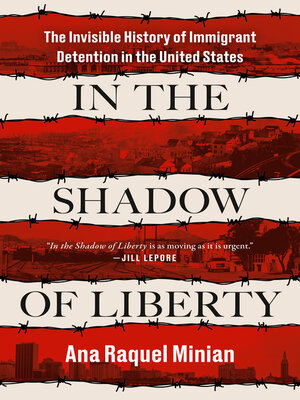In the Shadow of Liberty
ebook ∣ The Invisible History of Immigrant Detention in the United States
By Ana Raquel Minian

Sign up to save your library
With an OverDrive account, you can save your favorite libraries for at-a-glance information about availability. Find out more about OverDrive accounts.
Find this title in Libby, the library reading app by OverDrive.



Search for a digital library with this title
Title found at these libraries:
| Library Name | Distance |
|---|---|
| Loading... |
Winner of the PEN/John Kenneth Galbraith Award for Nonfiction
Finalist for the Zócalo Public Square Book Prize
“Meticulous . . . Storytelling allows Minian to convey the physical and emotional toll of detention with potent specificity. The result is a book-length plea against dehumanization, at least for those who are willing to listen.”
—Jennifer Szalai, The New York Times
A probing work of narrative history that reveals the hidden story of immigrant detention in the United States, deepening urgent national conversations around migration.
In 2018, many Americans watched in horror as children were torn from their parents at the US-Mexico border under Trump's "family separation" policy. But as historian Ana Raquel Minian reveals in In the Shadow of Liberty, this was only the latest chapter in a saga tracing back to the 1800s—one in which immigrants to the United States have been held without recourse to their constitutional rights. Braiding together the vivid stories of four migrants seeking to escape the turmoil of their homelands for the promise of America, In the Shadow of Liberty gives this history a human face, telling the dramatic story of a Central American asylum seeker, a Cuban exile, a European war bride, and a Chinese refugee.
As we travel alongside these indelible characters, In the Shadow of Liberty explores how sites of rightlessness have evolved, and what their existence has meant for our body politic. Though these "black sites" exist out of view for the average American, their reach extends into all of our lives: the explosive growth of the for-profit prison industry traces its origins to the immigrant detention system, as does the emergence of Guantanamo and the gradual unraveling of the right to bail and the presumption of innocence. Through these narratives, we see how the changing political climate surrounding immigration has played out in individual lives, and at what cost. But as these stories demonstrate, it doesn't have to be like this, and a better way might be possible.
Finalist for the Zócalo Public Square Book Prize
“Meticulous . . . Storytelling allows Minian to convey the physical and emotional toll of detention with potent specificity. The result is a book-length plea against dehumanization, at least for those who are willing to listen.”
—Jennifer Szalai, The New York Times
A probing work of narrative history that reveals the hidden story of immigrant detention in the United States, deepening urgent national conversations around migration.
In 2018, many Americans watched in horror as children were torn from their parents at the US-Mexico border under Trump's "family separation" policy. But as historian Ana Raquel Minian reveals in In the Shadow of Liberty, this was only the latest chapter in a saga tracing back to the 1800s—one in which immigrants to the United States have been held without recourse to their constitutional rights. Braiding together the vivid stories of four migrants seeking to escape the turmoil of their homelands for the promise of America, In the Shadow of Liberty gives this history a human face, telling the dramatic story of a Central American asylum seeker, a Cuban exile, a European war bride, and a Chinese refugee.
As we travel alongside these indelible characters, In the Shadow of Liberty explores how sites of rightlessness have evolved, and what their existence has meant for our body politic. Though these "black sites" exist out of view for the average American, their reach extends into all of our lives: the explosive growth of the for-profit prison industry traces its origins to the immigrant detention system, as does the emergence of Guantanamo and the gradual unraveling of the right to bail and the presumption of innocence. Through these narratives, we see how the changing political climate surrounding immigration has played out in individual lives, and at what cost. But as these stories demonstrate, it doesn't have to be like this, and a better way might be possible.







